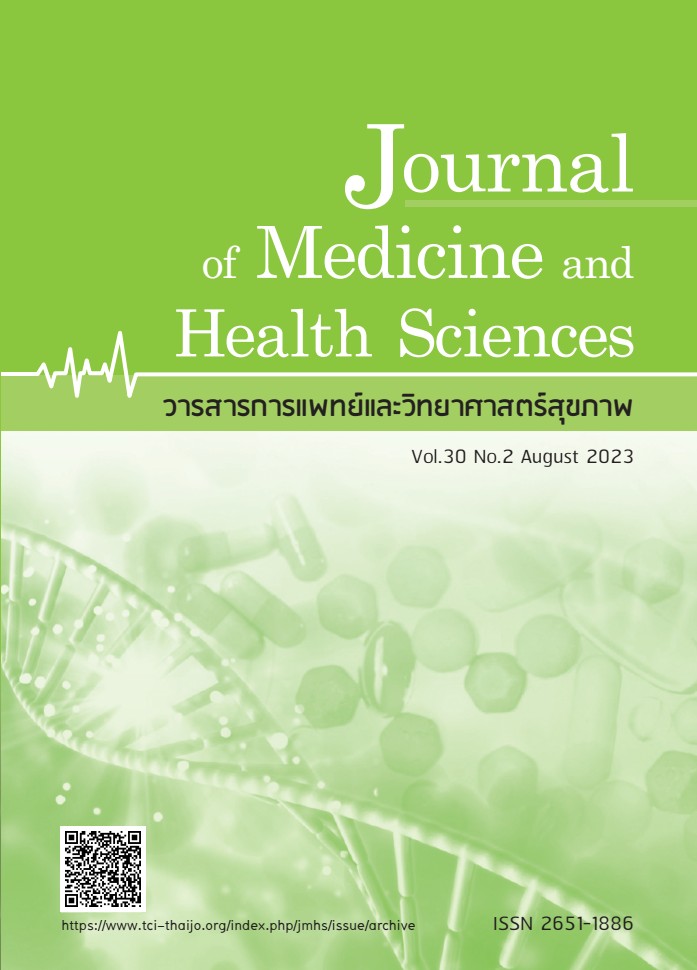Associations of a fast lifestyle and dietary intake during pregnancy
Keywords:
fast lifestyle, slow lifestyle, dietary intake, pregnancyAbstract
Currently, pregnant women tend to have an increased incidence of malnutrition as it relates to fast-paced and competitive working lifestyles. An analytical cross-sectional study was performed to study the relationship between a fast lifestyle and nutritional intake in a sample of pregnant women attending antenatal services in Narathiwat Hospital between June 2016 to February 2017. A total of 143 people were divided into two groups, groups with a slow and a fast lifestyle, with 73 people in each group. The relationship between lifestyle and dietary intake was analyzed using the Wilcoxon Rank Sum Test. The results showed that the age, educational level, and the personal income of both groups were statistically different. The median daily intake of energy, carbohydrates, protein, fat, vitamin C and niacin were not significantly different between the two groups (p>0.05). The slow lifestyle group received substantially more daily calcium and iron than the fast lifestyle group (p<0.05). The slow lifestyle group received significantly more vitamin A, B1, and B2 than the fast lifestyle group (p<0.01). In conclusion, there was no difference in the daily intake of energy, carbohydrates, protein, and fat between pregnant women with slow and fast lifestyles. Nevertheless, the slow lifestyle subjects received higher amounts of calcium, iron, vitamin A, B1, and B2 than the fast lifestyle subjects. However, compared to the dietary reference intake (DRI), it was found that pregnant women who lead slow lifestyles received sufficient amounts of vitamin B2 compared to the fast lifestyle group. Since the fast lifestyle pregnant women are at risk of malnutrition, healthcare professionals should educate them on how to eat properly and meet their body needs, including encouraging pregnant women to consume iron, folic, iodine, and calcium, according to the pregnancy plan.
References
Strategy and Planning Division. Thai public health report 2008-2010. Bangkok: Thai Health Promotion Foundation, Ministry of Public Health; 2010.
Bureau of Nutrition. The 5th Thailand food and nutrition survey report. Bangkok: Department of Health, Ministry of Public Health; 2003.
World Health Organization. Maternal anthropometry and pregnancy outcomes. A WHO collaborative study 1995;75 (Suppl):1-98.
Bureau of Reproductive Health. Annual report 2020. Nonthaburi: Department of Health, Ministry of Public Health, Ministry of Public Health; 2020.
Sombutpibul C. Slow living. health & exercise monthly magazine. 2003; 2(24):32.
Cheewajit column. Why do you rush?. Cheewajit Magazine. 2005; 7(157):84-85.
Department of Health Ministry of Public Health. Manual for global physical activity surveillance among general population in province by cross-sectional [Internet]. Nonthaburi: Department of Health Ministry of Public Health; 2009 [cited 2019 August 8]. Available from: http://203.157.7.40 /exercise/tiki- download_file.php?fileId =20. (In Thai)
Health Promotion Center 5. Maternal and child health standards 2017. Singburi: Health Promotion Center 5, Department of Health, Ministry of Public Health; 2017.
Chaengbumrung S, Mo-suwan L, Phonrat B, et al. Dietary Reference Intake for Thais 2020. 1st ed. Bangkok: Bureau of Nutrition, Department of Health, Ministry of Public Health; 2020.
Bureau of Health Promotion. Annual Report 2019 [Internet]. 2019. [cited 2018 May 27]. Available from: https://planning.anamai.moph.go.th/th/annual-report/1039#wow-book/
Flaxman SM, Sherman PW. Morning sickness: A mechanism for protecting mother and embryo. QRB 2000;75(2):113-48.
FAO, World Health Organization, United Nations University. Human energy requirements: Report of a joint FAO/WHO/UNU expert consultation: Rome, 2001. Rome: FAO; 2004.
Thidpad C, Banchonhattakit P. Effects of eating behavior program for pregnant women with weight gain during pregnancy in ANC clinic, Tertiary hospital, Khon Kaen province. SRIMEDJ 2013: 27(4): 347-353.
Waratornpaibul T. Consumption Behavior: Consumerism Food and Health-Conscious Food. PIMJ 2014; 5(2):255-64.
Ngoenying S. Effects of a health promotion program on nutritional health behavior and stress management in pregnant adolescents. JFONUBUU 2013; 21(4):37-48.
Sakunrad C. Food consumption behaviors in pregnancy. Buddhachinaraj Med J 2012; 29(1):180-9.
Downloads
Published
How to Cite
Issue
Section
License

This work is licensed under a Creative Commons Attribution-NonCommercial-NoDerivatives 4.0 International License.



